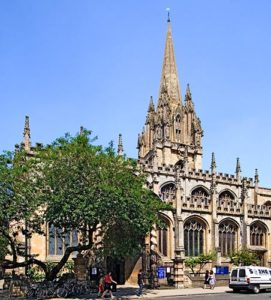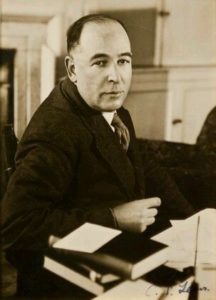The Church of Jesus Christ consists of all those who have received the truth about themselves and their relationship with God. It consists of those who have seen the awfulness of their sins, who have come to the Cross in repentance and faith for the forgiveness of those sins, and who have thereafter dedicated their lives to serving the One who gave His life for them.
 Those who have done so are the actual Church, and that Church has only one real purpose, as explained succinctly by C. S. Lewis:
Those who have done so are the actual Church, and that Church has only one real purpose, as explained succinctly by C. S. Lewis:
The Church exists for nothing else but to draw men into Christ, to make them little Christs. If they are not doing that, all the cathedrals, clergy, missions, sermons, even the Bible itself, are simply a waste of time.
God became Man for no other purpose. It is even doubtful, you know, whether the whole universe was created for any other purpose.
We, the Church, divide ourselves into different segments, which we call denominations. All too often, we look down on those not of our particular segment and miss the true spirit of the Holy Spirit. Yet, those who are truly His recognize the essential unity we all share regardless of where we choose to worship.
We may have different ideas on specific doctrines, but, as Lewis reminds us, we have a lot more in common than we may realize:
It is at her centre, where her truest children dwell, that each communion [denomination] is really closest to every other in spirit, if not in doctrine.
And this suggests at the centre of each there is something, or a Someone, who against all divergences of belief, all differences of temperament, all memories of mutual persecution, speaks with the same voice.
In my lifetime thus far, I have been associated with the following denominations: Lutheran, Assemblies of God, Mennonite, Wesleyan, Nazarene, Episcopal, and an assortment of independent fellowships that claimed no specific denominational ties. In all of them I found sincere Christians who desired with all their heart and soul to glorify God in Christ.
“The Church,” Lewis says, “will outlive the universe; in it the individual person will outlive the universe. Everything that is joined to the immortal Head will share His immortality.”
 All of these thoughts today lead me back to one of my favorite Lewis quotes, taken from his wonderful sermon, “The Weight of Glory.” Near the end of it, he tells us what our attitude should be toward one another, how we should view one another in the light of immortality.
All of these thoughts today lead me back to one of my favorite Lewis quotes, taken from his wonderful sermon, “The Weight of Glory.” Near the end of it, he tells us what our attitude should be toward one another, how we should view one another in the light of immortality.
It is a serious thing to live in a society of possible gods and goddesses, to remember that the dullest and most uninteresting person you can talk to may one day be a creature which, if you saw it now, you would be strongly tempted to worship, or else a horror and a corruption such as you now meet, if at all, only in a nightmare.
All day long we are, in some degree, helping each other to one or other of these destinations. It is in the light of these overwhelming possibilities, it is with the awe and the circumspection proper to them, that we should conduct all our dealings with one another, all friendships, all loves, all play, all politics.
There are no ordinary people. You have never talked to a mere mortal.
Nations, cultures, arts, civilisations—these are mortal, and their life is to ours as the life of a gnat. But it is immortals whom we joke with, work with, marry, snub, and exploit—immortal horrors or everlasting splendours.
If that is true, as I believe it is, it should be the very guideline we follow as we interact with one another, and all our interactions should be aimed, ultimately, at helping others to become one of those everlasting splendors God wants to fashion. For the Church exists for nothing else but to draw men into Christ, to make them little Christs.
